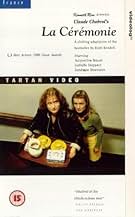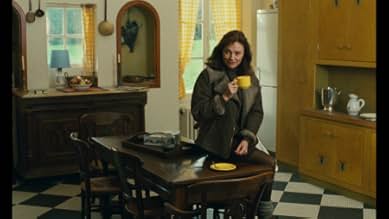AVALIAÇÃO DA IMDb
7,5/10
15 mil
SUA AVALIAÇÃO
Uma empregada recém-contratada para uma família rica faz amizade com um funcionário dos correios que a encoraja a se rebelar contra seus empregadores.Uma empregada recém-contratada para uma família rica faz amizade com um funcionário dos correios que a encoraja a se rebelar contra seus empregadores.Uma empregada recém-contratada para uma família rica faz amizade com um funcionário dos correios que a encoraja a se rebelar contra seus empregadores.
- Direção
- Roteiristas
- Artistas
- Prêmios
- 9 vitórias e 11 indicações no total
Avaliações em destaque
I see this movie for the third time and can't prevent myself to notice the pure Claude Chabrol style in the critic of the rich people, especially in the province. But the ending is very bloody and surprising too. And in the mean time, since my last viewing, I saw PARASITES and I can't also prevent myself to see a thin line between the two features. If you have seen both features, you see what I mean. A pure delight.
A rich French family hires a mousy maid who has some peculiar traits. It starts out as a nice character study, with Bonnaire creating a sympathetic figure as a young woman who struggles with her illiteracy but is too ashamed to to let anyone know about it. In the last act, however, the film goes south, turning into a silly thriller. The ending is particularly contrived and ridiculous. Bonnaire is quite good as the maid, as is Bisset (speaking in French) as her kindly employer. In fact the whole cast is fine. Chabrol is regarded as the French Hitchcock, but he lacks the master's skill for building suspense with wit and subtlety.
In this character study of two hateful middle-aged women (not so middle-aged in the movie, however, as in the novel by Ruth Rendell) we are made to fathom the bad that may befall the good.
Claude Chabrol's direction is clean, crisp and uncluttered--which isn't always the case, witness his Madame Bovary (1991), which is a bit too leisurely and L'Enfer (1993) which muddles a whole lot. Maybe it's the editing. Anyway this is more like his quietly brilliant Une affaire de femmes (1988) with a fine script and striking performances by Sandrine Bonnaire and Isabelle Huppert, handsomely supported by Jacqueline Bisset, Jean Pierre Cassel and the very pretty Virginie Ledoyen.
Bonnaire plays Sophie, an intense taciturn woman harboring dark secrets, whom the Leliévres have hired to cook and keep house at their country home. Bisset is Catherine Leliévre and Cassel her husband. They exist in bourgeois heaven avec matrimonial bliss with two teenagers, a family so closely knit and so charmingly together that they watch a two-part production of Mozart's Don Giovanni on TV, just the four of them cosily on the couch.
Well, this sort of unobtainable happiness doesn't sit well with Jeanne (Huppert) who is a lowly postal clerk living alone whose past includes the (accidental?) killing of her four-year-old daughter. Jeanne takes a fancy to the Leliévre's strange new maid with the idea of showing her something besides work. They strike up a fateful friendship that we know is leading to something horrible.
Huppert is as good as I've seen her, which is very good indeed. She is particularly striking here in an uncharacteristic role as a spiteful, working class woman with a heart of vengeance against anybody better off than she is. There is just a touch of sly irony in her performance suggesting that she is having a particularly good time playing the nasty. Bonnaire's stark performance as the unbalanced and humorless, reclusive Sophie will remain etched in your brain. Apart they are like inert, harmless chemicals. Together they catalyze one another and become brazen and explosive.
The story, filled with little foreshadowing of the tragedy to come, gilds the lily of our tristesse by making the Leliévres so very, very nice. We are reminded of the violent hatred by the proletariat toward the privileged classes, in this case acted out by two loonies against an innocent, but representative family, echoing not only the Russian Revolution but even more so the French Revolution, now two hundred years old.
What I am trying to figure out why this is called La Cérémonie. Maybe it is a ceremony of execution.
(Note: Over 500 of my movie reviews are now available in my book "Cut to the Chaise Lounge or I Can't Believe I Swallowed the Remote!" Get it at Amazon!)
Claude Chabrol's direction is clean, crisp and uncluttered--which isn't always the case, witness his Madame Bovary (1991), which is a bit too leisurely and L'Enfer (1993) which muddles a whole lot. Maybe it's the editing. Anyway this is more like his quietly brilliant Une affaire de femmes (1988) with a fine script and striking performances by Sandrine Bonnaire and Isabelle Huppert, handsomely supported by Jacqueline Bisset, Jean Pierre Cassel and the very pretty Virginie Ledoyen.
Bonnaire plays Sophie, an intense taciturn woman harboring dark secrets, whom the Leliévres have hired to cook and keep house at their country home. Bisset is Catherine Leliévre and Cassel her husband. They exist in bourgeois heaven avec matrimonial bliss with two teenagers, a family so closely knit and so charmingly together that they watch a two-part production of Mozart's Don Giovanni on TV, just the four of them cosily on the couch.
Well, this sort of unobtainable happiness doesn't sit well with Jeanne (Huppert) who is a lowly postal clerk living alone whose past includes the (accidental?) killing of her four-year-old daughter. Jeanne takes a fancy to the Leliévre's strange new maid with the idea of showing her something besides work. They strike up a fateful friendship that we know is leading to something horrible.
Huppert is as good as I've seen her, which is very good indeed. She is particularly striking here in an uncharacteristic role as a spiteful, working class woman with a heart of vengeance against anybody better off than she is. There is just a touch of sly irony in her performance suggesting that she is having a particularly good time playing the nasty. Bonnaire's stark performance as the unbalanced and humorless, reclusive Sophie will remain etched in your brain. Apart they are like inert, harmless chemicals. Together they catalyze one another and become brazen and explosive.
The story, filled with little foreshadowing of the tragedy to come, gilds the lily of our tristesse by making the Leliévres so very, very nice. We are reminded of the violent hatred by the proletariat toward the privileged classes, in this case acted out by two loonies against an innocent, but representative family, echoing not only the Russian Revolution but even more so the French Revolution, now two hundred years old.
What I am trying to figure out why this is called La Cérémonie. Maybe it is a ceremony of execution.
(Note: Over 500 of my movie reviews are now available in my book "Cut to the Chaise Lounge or I Can't Believe I Swallowed the Remote!" Get it at Amazon!)
Based on Ruth Rendell's Judgment in Stone, French auteur Claude Charbol transplanted this quintessentially English thriller about class and guilt to France, where he can fire more bullets at his favorite target - the French bourgeoisie. Without giving too much away, the story unfolds at a slow pace to reveal the class divisions and complex psychological issues that drive the characters' motivations. Centring on an illiterate maid, Sophie, who goes to desperate lengths to hide her "disability" from her employers, the wealthy Lelievre family, she eventually strikes a bond with the local postmistress who has mysterious grudge against her friend's employers. This film provided Chabrol with plenty of opportunities to criticize the disaffected bonhomie of the Levlievre family, but at times his presentation of some members of the Levlievres actually enlists our sympathy and therefore strikes a blow to the validity of his critique of French bourgeoisie values. Perhaps this was his intent to create more ambiguity than most psychological thrillers in this genre would allow. It's worth watching for the climax alone which has a delicious twist worthy of a mass-market Hollywood sequel.
The upper-class owner of a gallery Catherine Lelievre (Jacqueline Bisset) hires the efficient and quiet maid Sophie Bonhomme (Sandrine Bonnaire) for working in the family manor in the countryside of France. Her husband Georges Lelievre (Jean-Pierre Cassel), who is an opera lover, her daughter Melinda (Virginie Ledoyen) and her teenage son Gilles (Valentin Merlet) welcome Sophie and appreciate her work. Soon Sophie befriends the postmistress Jeanne (Isabelle Huppert), who is a social outcast, and she encourages Sophie to rebel against her employers, but the maid stays submissive. However, Sophie is ashamed of a secret and feels uncomfortable in many situations, finding a way to hide her secret. When Georges tells to Sophie that he does not want Jeanne in his house, Sophie stands up against him. Melinda discovers her secret and Sophie blackmails her, but Melinda tells her parents what has happened. Georges fires Sophie and she returns to the house later with Jeanne on the rampage with tragic consequences.
"La Cérémonie" is one of the best films by Claude Chabrol and it is still impressive after watching many years after the release. The poignant story of class conflict, alienation and even evilness of two outcast working-class women stays in the mind of the viewer since it might happen to anyone that has a maid at home. The unexpected violent conclusion is probably the source of inspiration for Michael Haneke's "Funny Games" (1997). It is impossible to the viewer to be not affected by the despicable and cruel behavior of the repressed Sophie and the envious Jeanne. My vote is nine.
Title (Brazil): "Mulheres Diabólicas" ("Evil Women")
Note: On 21 April 1999, I saw this film again.
Note On 08 May 2017, I saw this film again.
Note: On 08 January 2025, I saw this film again.
"La Cérémonie" is one of the best films by Claude Chabrol and it is still impressive after watching many years after the release. The poignant story of class conflict, alienation and even evilness of two outcast working-class women stays in the mind of the viewer since it might happen to anyone that has a maid at home. The unexpected violent conclusion is probably the source of inspiration for Michael Haneke's "Funny Games" (1997). It is impossible to the viewer to be not affected by the despicable and cruel behavior of the repressed Sophie and the envious Jeanne. My vote is nine.
Title (Brazil): "Mulheres Diabólicas" ("Evil Women")
Note: On 21 April 1999, I saw this film again.
Note On 08 May 2017, I saw this film again.
Note: On 08 January 2025, I saw this film again.
Você sabia?
- CuriosidadesThe author Ruth Rendell has said that Claude Chabrol's version of her novel "A Judgement in Stone" is one of the few film adaptations of her work that she is happy with.
- Citações
Georges Lelievre: [referring, respectively, to Sophie the illiterate maid and Jeanne the nosy postal clerk] What a pair: one can't read at all, and the other reads our mail.
- ConexõesFeatured in Isabelle Huppert: Message personnel (2020)
- Trilhas sonorasCello Symphony
Composed by Benjamin Britten
Principais escolhas
Faça login para avaliar e ver a lista de recomendações personalizadas
- How long is The Ceremony?Fornecido pela Alexa
- Why is the film called La cérémonie? Is it because of the ending?? I know its based of a book so it might be more explicit in there.I'll try to look into it but I would appreaciate any feedback.
Detalhes
- Data de lançamento
- Países de origem
- Central de atendimento oficial
- Idioma
- Também conhecido como
- The Ceremony
- Locações de filme
- Empresas de produção
- Consulte mais créditos da empresa na IMDbPro
Bilheteria
- Faturamento bruto nos EUA e Canadá
- US$ 873.196
- Faturamento bruto mundial
- US$ 873.196
- Tempo de duração1 hora 51 minutos
- Cor
- Mixagem de som
- Proporção
- 1.66 : 1
Contribua para esta página
Sugerir uma alteração ou adicionar conteúdo ausente

Principal brecha
By what name was Mulheres Diabólicas (1995) officially released in India in Hindi?
Responda
![Assistir a Bande-annonce [OV]](https://m.media-amazon.com/images/M/MV5BNzliMDEwMzYtMjg1NS00Mjc1LTkwNDktMzc1MmJkNDJjZDIxXkEyXkFqcGdeQXRyYW5zY29kZS13b3JrZmxvdw@@._V1_QL75_UX500_CR0)




























